Cartoon Club Presents "Welcome to Springfield: An Entry Level Guide to the Most Successful Show in Television History"
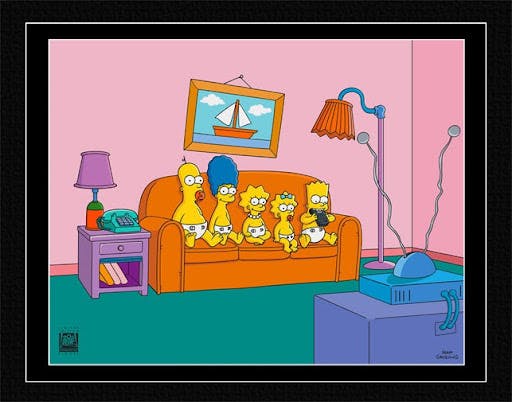
Posted February 16, 2022
A guide to Springfield's favorite family.
By Jacob Rubin
Did you know there are people walking this earth who have never watched The Simpsons? It’s true! And I’m not talking about particularly young people, I’m talking about people who were born before the mid-90s who had plenty of opportunities to catch the show in its infinite reruns or even the occasional new episode on Fox, where it has maintained its stranglehold on Sundays at 8PM for over two decades. The show has had its peaks (the early years) and valleys (the not early years) but has performed fairly well into a time period where TV ratings have less and less meaning. Also, it’s very funny!
Now, this isn’t to judge. There are a myriad of reasons why someone may not have watched The Simpsons up to this point (no interest in animation, parents controlled their media intake, only recently discovered the wonders of electricity, etc.) but that doesn’t matter. If you’re reading this article and would like to start watching The Simpsons, this list is for you.
“But why wouldn’t I just start at Season 1?” Hey, great question! The honest answer is that it took a few years for the show to become the earth-shattering joke machine that made it a beloved TV institution. There are still good enough episodes in those early years but the characters weren’t quite developed, the jokes had less bite to them, and the animation was a little clunky. If you started at Season 1, you might struggle to realize why this show, this show, became the media juggernaut that it is, with a major motion picture and rides at two (two!) different Universal Studios parks.
[There is also an argument that you should start at the actual beginning, as in the shorts that aired as a part of The Tracy Ullman Show from 1987 to 1989. This is an argument similar to arguing that you should eat raw flour, eggs, sugar, and butter and let the pancakes form themselves in your tum-tum, but it’s an argument all the same.]
What I’m looking to do here is lay out a few episodes that work as sufficient jumping-on points. These are episodes that can be enjoyed devoid of any context and that stand on their own, while also functioning as effective showcases for the rest of the series. Straight up: a lot of classics aren’t on this list (Last Exit to Springfield, Marge vs. the Monorail, Itchy and Scratchy Land, Homer’s Enemy, Cape Feare, any flashbacks or Halloween episodes) simply because they can’t be fully appreciated until the viewer has a general awareness of the characters and their relationships. Watch the episodes on this list, then go for the big time hits. You’ll understand why at the time.
“Duffless”
Season 4
Episode 16
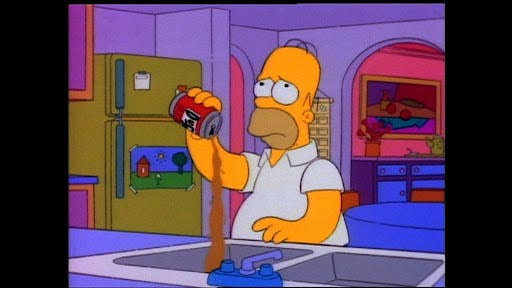
The Simpsons is about the Simpsons. That may seem like a stupid sentence, but it really isn’t: many episodes put a greater focus on side characters and their relationship with the family than on the family dynamics themselves. (Deservedly so, Springfield rules.) This particular episode has two stories: an A-story about Homer’s relationship with Marge (specifically through his relationship with alcohol) and a B-story following a rivalry between Bart and Lisa (centered on the upcoming Springfield Elementary science fair). The most essential traits of each character are on display: Homer is oafish but kind, Marge is nagging but loving, Lisa is clever but petty, and Bart is dim but tremendously street-smart (especially for a ten-year-old).
And that’s to say nothing about the fantastic comedy in this episode! The rare settings of the science fair and the Duff brewery lead to some excellent bits and develop the world of Homer’s favorite beer more than any other, there’s a Troy McClure appearance (always a treat) and some all-timer moments from Wiggum, Barney, and Skinner. There is one joke that might confuse casual viewers when Homer gets his license voided (that’s Marge’s sister, she and Homer do not get along) but otherwise this is perfect entry level material.
"Bart the Lover"
Season 3
Episode 15
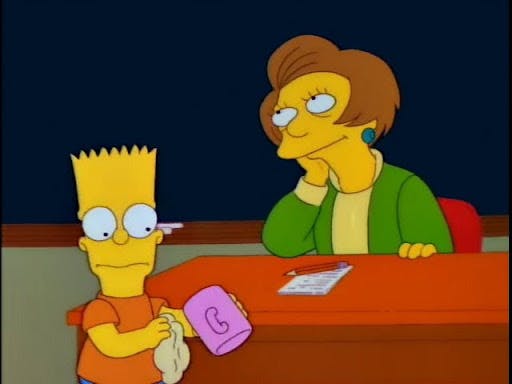
This episode functions as a strong showcase for two of the most well-rounded supporting characters in the show: Bart’s teacher, Mrs. Edna Krabappel (voiced by the late, great Marcia Wallace), and the Simpsons’ next door neighbor, Ned Flanders. After Mrs. Krabappel confiscates Bart’s yo-yo and gives him detention, Bart poses as a single man interested in Edna (catfishing her eighteen years before the film of the same name) to get revenge. Meanwhile, Homer’s casual swearing while building a doghouse has an effect on Ned Flanders’ son Todd, leading to a dispute between the two neighbors.
In the same way that “Duffless” displays the family in conflict with one another, “Bart the Lover” shows how the family functions when they come together to solve a problem. This is one of the most cruel-hearted pranks Bart ever performs, but the solution is smart and kind, and the gags revolving around their courtship are humorous and heartfelt. Additionally, through the Homer swearing subplot, we get a perfect primer on Ned Flanders, as this episode hits basically every beat of his character simply and emphatically.
"Homer Defined"
Season 3
Episode 5
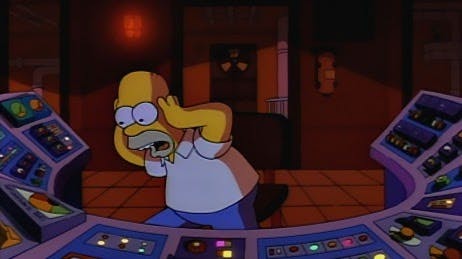
Early on (and still to this day, but mostly early on), there is a lot of comedy drawn from the fact that Homer, whose comical ineptitude is his core personality trait, is the safety inspector of a nuclear power plant. The writers of the show clearly see nuclear power as a dangerous and somewhat evil aspect of society. And this episode, where Homer has to prevent a life-threatening core meltdown to save the town, showcases all of their views on the subject: nuclear power is capable of being run by idiots like Homer and greedy megalomaniacs like Mr. Burns, but will also kill everyone if the slightest thing goes wrong. Comedy! The rapid-fire barrage of jokes surrounding the meltdown, showing all nature of reactions inside the plant, and in the city at large, are where this episode sings, as the writers hit you with every response to unmitigated disaster they could think of.
This episode is a great and simple showcase for Mr. Burns,as we see many aspects of his personality: selfish, boastful, enraged, and so old that he struggles to give a simple thumbs-up. Smithers also gets some good stuff in as the ever put-upon lackey, and Lisa gets some time to shine as she begins to revere her father after his act of heroism, even when all he’s doing is complaining about his new responsibilities and drinking at Moe’s.
The subplot is a simplistic one (Milhouse can’t be friends with Bart anymore) but it leads to some classic Bart lines and sweet moments between Bart and Marge as well as Bart and Milhouse (always and forever Bart’s perfect foil).
"Lisa the Greek"
Season 3
Episode 13
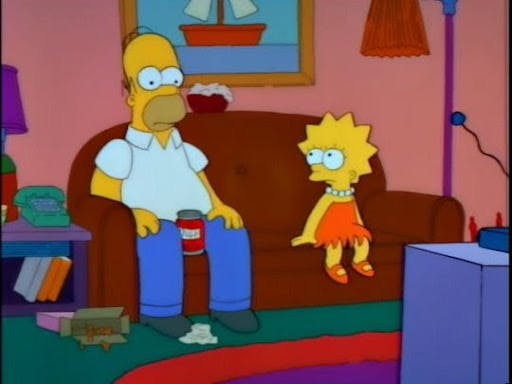
You can always expect strong moments in episodes that center around the relationship between Homer and Lisa, and this is probably the best one: Lisa attempts to bond with her father by developing an interest in football. Homer is resistant until he discovers her incredible ability to predict winners, which feeds into his gambling. The episode plays out almost like a G-rated Uncut Gems: the stakes slowly ramp up and Homer has to rearrange his priorities to maintain his relationship with his daughter.
This episode is full of sweet moments as well as a plethora of amusing gags mocking the overall fan culture surrounding professional sports. Lisa gets a lot of great lines here, with her absurd but ultimately accurate rationales as to how she picks the winners of each game. Additionally, there is a short-but-sweet subplot focusing on Marge and Bart going on a shopping trip, acting as a lower-stakes reflection of the Homer-Lisa storyline.
"Lisa's Rival"
Season 6
Episode

Lisa Simpson’s entire identity is built around her superiority to the people around her. Her intellect, musicianship, and moral compass all function to give the rest of the family (and sometimes other characters) something to strive toward. This episode posits the simple concept of: what if someone was Lisa, but better? Enter Allison Taylor, voiced by Winona Ryder*, who is better than Lisa in every aspect that gives Lisa her identity. Their (fairly one-sided) conflict pushes Lisa’s character in new directions. She even resorts to bringing in Bart to help her claim satisfaction over this new nemesis. This episode also functions as a perfect introduction to Ralph Wiggum, the gentle dimwit in Lisa’s class. (His biggest showcase came two seasons earlier, in Season 4’s “I Love Lisa”, but I feel this episode provides a simple and graceful entry into his non-sequitur-spouting unawareness.)
*[“The Simpsons” has a long-standing tradition of employing celebrity guest stars to boost an episode’s concept or ratings to new heights, this can lead to unforgettable moments or tacky gimmickry. It’s honestly surprising that this is the lone episode on this list that features a guest star. (Phil Hartman doesn’t count.)]
Additionally, this episode features one of the most bizarre and incredible subplots: Homer finds a giant pile of sugar and swears to figure out how to profit off this discovery. Every beat in this story is genuine cartoon absurdity filled with classic Homer moments. The Lisa-Allison story is strong enough, but this Homer story literally could not be told with any other character in the history of fiction. The combination of cunning, sloth, ignorance, positivity, and imaginative hyperbole spells Homer out to a tee, and the secondary nature of the plot means the stakes can stay nice and low.
So that’s my list! If you’ve never seen “The Simpsons” and are looking for a place to start, any one of these episodes would make for a great jumping-on point. Are you a huge Simpsons fan who thinks I missed a great one? Tweet the episode to me @jacobsrubin and I’ll tell you if it’s a good starter episode or not. Then we can have an argument! The internet was a mistake. Here’s a picture of me as Ned Flanders.

Join our Discord for more information about Cartoon Club, a club where we watch cartoons every Saturday morning!
